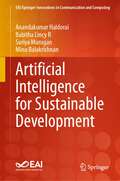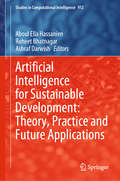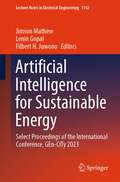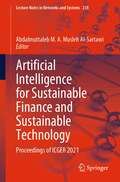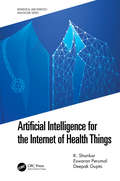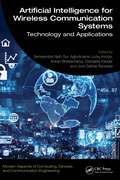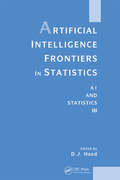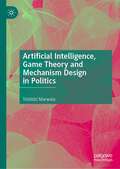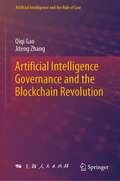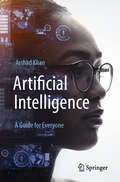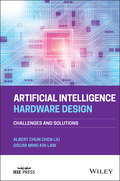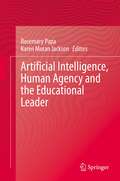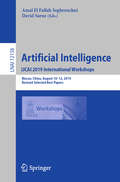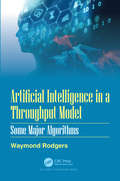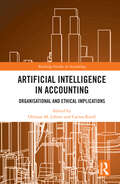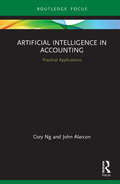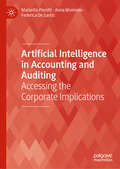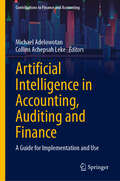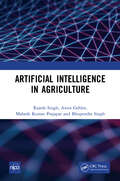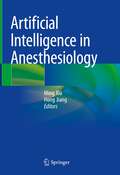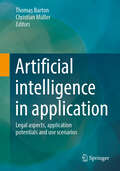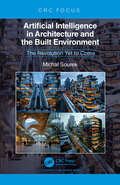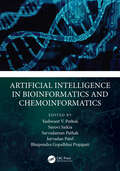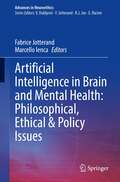- Table View
- List View
Artificial Intelligence for Sustainable Development (EAI/Springer Innovations in Communication and Computing)
by Anandakumar Haldorai Babitha Lincy R Suriya Murugan Minu BalakrishnanThis book delves into the synergy between AI and sustainability. This comprehensive guide illuminates the latest trends and cutting-edge techniques, offering invaluable insights for researchers, practitioners, and policymakers interested in the cross-section of AI and sustainability. The authors illustrate how AI-driven innovations are revolutionizing environmental conservation, urban planning, healthcare, and more. The book also considers the ethical considerations and governance frameworks crucial to harnessing AI's potential for global benefit. Whether a seasoned expert or a curious newcomer, this book empowers readers to navigate the dynamic landscape of AI and sustainability, paving the way for a more eco-conscious and equitable world.
Artificial Intelligence for Sustainable Development: Theory, Practice and Future Applications (Studies in Computational Intelligence #912)
by Aboul Ella Hassanien Roheet Bhatnagar Ashraf DarwishThis book highlights the latest advances in the field of artificial intelligence and related technologies, with a special focus on sustainable development and environmentally friendly artificial intelligence applications. Discussing theory, applications and research, it covers all aspects of artificial intelligence in the context of sustainable development.
Artificial Intelligence for Sustainable Energy: Select Proceedings of the International Conference, GEn-CITy 2023 (Lecture Notes in Electrical Engineering #1142)
by Jimson Mathew Lenin Gopal Filbert H. JuwonoThis book presents select proceedings of the International Conference on Green Energy, Computing, and Intelligent Technology (GEn-CITy 2023) held at the University of Southampton Malaysia in July 2023. This book primarily covers clean energy and intelligent technologies for a sustainable future. This book serves as a forum for engineers, researchers, and specialists from academia, research centers, and industry worldwide to discuss and present the latest developments and applications related to the challenges of securing green and clean energy sources for the 21st century to protect the environment.
Artificial Intelligence for Sustainable Finance and Sustainable Technology: Proceedings of ICGER 2021 (Lecture Notes in Networks and Systems #423)
by Abdalmuttaleb M. A. Musleh Al-SartawiThis book shows latest research on artificial intelligence for sustainable technology. ICGER 2021 was organized by the Accounting, Finance and Banking Department at Ahlia University, Bahrain, and was conducted on the 15th and 16th of September. The strategic partners included the University of Jordan, the Bahrain Economists Society, the Association of Chartered Certified Accountants: ACCA, Al-Barka Banking Group and the International Computer Auditing Education Association: ICAEA . The theme of the ICGER 2021 centered around artificial intelligence for sustainable finance and sustainable technology. Accordingly, the papers presented at the conference provided a holistic view of sustainable finance, sustainability, AI, financial technology, cybersecurity, blockchain, CSR, and governance. This book, unlike ever before, brings together intelligence applications of new technologies and the sustainability requirements in the era of the digital economy, with special attention given to the opportunities, challenges, for education, business growth, and economic progression of nations which will help societies (economists, financial managers, engineers, ICT specialists, digital managers, data managers, policymakers, regulators, researchers, academics, and students) to better understand, use, and control AI applications and financial technologies to develop future strategies and to achieve sustainable development goals.
Artificial Intelligence for the Internet of Health Things (Biomedical and Robotics Healthcare)
by K. Shankar Eswaran Perumal Deepak GuptaThis book discusses research in Artificial Intelligence for the Internet of Health Things. It investigates and explores the possible applications of machine learning, deep learning, soft computing, and evolutionary computing techniques in design, implementation, and optimization of challenging healthcare solutions. This book features a wide range of topics such as AI techniques, IoT, cloud, wearables, and secured data transmission. Written for a broad audience, this book will be useful for clinicians, health professionals, engineers, technology developers, IT consultants, researchers, and students interested in the AI-based healthcare applications. Provides a deeper understanding of key AI algorithms and their use and implementation within the wider healthcare sector Explores different disease diagnosis models using machine learning, deep learning, healthcare data analysis, including machine learning, and data mining and soft computing algorithms Discusses detailed IoT, wearables, and cloud-based disease diagnosis model for intelligent systems and healthcare Reviews different applications and challenges across the design, implementation, and management of intelligent systems and healthcare data networks Introduces a new applications and case studies across all areas of AI in healthcare data K. Shankar (Member, IEEE) is a Postdoctoral Fellow of the Department of Computer Applications, Alagappa University, Karaikudi, India. Eswaran Perumal is an Assistant Professor of the Department of Computer Applications, Alagappa University, Karaikudi, India. Dr. Deepak Gupta is an Assistant Professor of the Department Computer Science & Engineering, Maharaja Agrasen Institute of Technology (GGSIPU), Delhi, India.
Artificial Intelligence for Wireless Communication Systems: Technology and Applications (Modern Aspects of Computing, Devices, and Communication Engineering)
by Samarendra Nath Sur Agbotiname Lucky Imoize Ankan Bhattacharya Debdatta Kandar Jyoti Sekhar BanerjeeThe text provides a comprehensive study of the application of advanced artificial intelligence (AI) in next-generation wireless communications with a focus on theory, standardization, and core development. It further highlights AI-enabled intelligent architecture for sixth-generation (6G) networks to realize smart resource management, automatic network adjustment, and intelligent service layers. The book covers artificially assisted non-orthogonal multiple access schemes for 6G communication.This book: Discusses the use of AI in various aspects of wireless communications, including channel modeling, signal detection, channel coding design, and resource management Explores technical challenges in the ubiquitous fifth-generation (5G) wireless networks and the prospects of introducing artificial intelligence-based techniques in the envisioned 6G wireless networks Presents potential issues in AI-enabled approaches in wireless communications Covers AI-enabled energy efficiency optimization and cross-layer optimization in the next-generation wireless networks Explains artificially empowered security and privacy schemes in next-generation wireless networks and next-generation mobile management It is primarily written for senior undergraduates, graduate students, and academic researchers in the fields of electrical engineering, electronics and communication engineering, and computer engineering.
Artificial Intelligence Frontiers in Statistics: Al and Statistics III
by David J. HandThis book presents a summary of recent work on the interface between artificial intelligence and statistics. It does this through a series of papers by different authors working in different areas of this interface. These papers are a selected and referenced subset of papers presented at the 3rd Interntional Workshop on Artificial Intelligence and Statistics, Florida, January 1991.
Artificial Intelligence, Game Theory and Mechanism Design in Politics
by Tshilidzi MarwalaThis book explores how AI and mechanism design can provide a new framework for international politics. The international political system is all manners in which countries, governments and people relate. Mechanism design in international politics relates to identifying rules that define relationships between people and countries that achieve a particular outcome, e.g., peace or more trade or democracy or economic development. Artificial intelligence is technique of making machines intelligent. This book explores mechanism design and artificial intelligence in international politics and applies these technologies to politics, economy and society. This book will be of interest to scholars of international relations, politics, sustainable development, and artificial intelligence.
Artificial Intelligence Governance and the Blockchain Revolution (Artificial Intelligence and the Rule of Law)
by Qiqi Gao Jiteng ZhangThis is the first professional academic work in China to discuss artificial intelligence and blockchain together. Artificial intelligence is a productivity revolution, and its development has a significant and profound impact on global changes. However, at the same time, its development also brings a series of challenges to human society, such as privacy, security, and fairness issues. Therefore, the significance of blockchain is even more prominent. Blockchain is a revolution in production relations, which will propose important solutions to the challenges of privacy, security, and fairness that arise after the development of artificial intelligence. The book not only discusses the problems currently faced by the development of artificial intelligence, as well as the new opportunities and challenges that artificial intelligence brings to future global governance, but also explains the further development direction of the intelligent revolution from the perspective of blockchain.
Artificial Intelligence: A Guide for Everyone
by Arshad KhanEnterprises, as well as individuals, are racing to reap the benefits of AI. However, in most cases, they are doing so without understanding the technology or its implications and risks, which can be significant. Artificial Intelligence: A Guide for Everyone is a step in addressing that gap by providing information that readers can easily understand at every level. This book aims to provide useful information to those planning, developing, or using AI, which has the potential to transform industries and shape the future. Whether you are stepping into the world of AI for the first time or are a seasoned professional seeking deeper insights, this comprehensive guide ensures that both beginners and experienced individuals find value within its pages. Artificial Intelligence: A Guide for Everyone encompasses theoretical as well as practical aspects of AI across various industries and applications. It demystifies AI by explaining, in a language that non-techies can follow, its history, different types, differentiating technologies, and various aspects of implementation. It explains the connection between AI theory and real-world application across diverse industries and how it fuels innovation. Whether you are an executive, student, professional, seasoned businessperson, or simply curious about the future of technology, Artificial Intelligence: A Guide for Everyone equips you with the knowledge to navigate this transformative field with confidence.
Artificial Intelligence Hardware Design: Challenges and Solutions
by Albert Chun-Chen Liu Oscar Ming LawARTIFICIAL INTELLIGENCE HARDWARE DESIGN Learn foundational and advanced topics in Neural Processing Unit design with real-world examples from leading voices in the field In Artificial Intelligence Hardware Design: Challenges and Solutions, distinguished researchers and authors Drs. Albert Chun Chen Liu and Oscar Ming Kin Law deliver a rigorous and practical treatment of the design applications of specific circuits and systems for accelerating neural network processing. Beginning with a discussion and explanation of neural networks and their developmental history, the book goes on to describe parallel architectures, streaming graphs for massive parallel computation, and convolution optimization. The authors offer readers an illustration of in-memory computation through Georgia Tech’s Neurocube and Stanford’s Tetris accelerator using the Hybrid Memory Cube, as well as near-memory architecture through the embedded eDRAM of the Institute of Computing Technology, the Chinese Academy of Science, and other institutions. Readers will also find a discussion of 3D neural processing techniques to support multiple layer neural networks, as well as information like: A thorough introduction to neural networks and neural network development history, as well as Convolutional Neural Network (CNN) models Explorations of various parallel architectures, including the Intel CPU, Nvidia GPU, Google TPU, and Microsoft NPU, emphasizing hardware and software integration for performance improvement Discussions of streaming graph for massive parallel computation with the Blaize GSP and Graphcore IPU An examination of how to optimize convolution with UCLA Deep Convolutional Neural Network accelerator filter decomposition Perfect for hardware and software engineers and firmware developers, Artificial Intelligence Hardware Design is an indispensable resource for anyone working with Neural Processing Units in either a hardware or software capacity.
Artificial Intelligence, Human Agency and the Educational Leader
by Rosemary Papa Karen Moran JacksonThis book includes contributions by scholars from a variety of disciplines, the dialogue and discourse on how AI (artificial intelligence) development includes and/or excludes pedagogical educational learning theories focused on the learner. A call from Educational Leaders Without Borders (ELWB) was issued to scholars from across the globe who were asked to write a vignette described as an evocative description or account on how education leaders envision education in 2051 and A.I. beyond mere product purchase. These vignettes should engage us in questions as to how the development and use of AI technologies are shaped. As educators who believe education should be established on social justice beliefs and practices, our review of literature shows there are no books addressing the complexities of A.I. development and the role of educators. The futuristic element is unique in its approach to imagine a socially just better world in which to inspire educators. This unique feature encourages creativity in how one addresses the call to imagine a future world and our role as educators in that world.
Artificial Intelligence. IJCAI 2019 International Workshops: Macao, China, August 10–12, 2019, Revised Selected Best Papers (Lecture Notes in Computer Science #12158)
by Amal El Fallah Seghrouchni David SarneThis book presents selected papers of 12 Workshops held in conjunction with the 28th International Joint Conference on Artificial Intelligence, IJCAI 2019, in Macao, China, in August 2019.The workshops included in this volume are: AI4KM 2019: 7th International Workshop on Artificial Intelligence for Knowledge Management and Innovation.FinNLP 2019: First International Workshop on Financial Technology and Natural Language Processing.OR 2019: 32nd International Workshop on Qualitative Reasoning.SURL 2019: Second International Workshop on Scaling-Up Reinforcement Learning.First International Workshop on Bringing Semantic Knowledge into Vision and Text Understanding.EASyHAT 2019: First International Workshop on Evaluation of Adaptive Systems for Human-Autonomy Teaming.ACAN 2019: 12th International Workshop on Agent-based Complex Automated Negotiations.First International Workshop on Deep Learning for Human Activity Recognition.HAI 2019: Second International Workshop on Humanizing AI.International Workshop on Language Sense on Computer.AISafety 2019: International Workshop on Artificial Intelligence Safety.DeLBP 2019: 4th International Workshop on Declarative Learning Based Programming.
Artificial Intelligence in a Throughput Model: Some Major Algorithms
by Waymond RodgersPhysical and behavioral biometric technologies such as fingerprinting, facial recognition, voice identification, etc. have enhanced the level of security substantially in recent years. Governments and corporates have employed these technologies to achieve better customer satisfaction. However, biometrics faces major challenges in reducing criminal, terrorist activities and electronic frauds, especially in choosing appropriate decision-making algorithms. To face this challenge, new developments have been made, that amalgamate biometrics with artificial intelligence (AI) in decision-making modeling. Advanced software algorithms of AI, processing information offered by biometric technology, achieve better results. This has led to growth in the biometrics technology industry, and is set to increase the security and internal control operations manifold. This book provides an overview of the existing biometric technologies, decision-making algorithms and the growth opportunity in biometrics. The book proposes a throughput model, which draws on computer science, economics and psychology to model perceptual, informational sources, judgmental processes and decision choice algorithms. It reviews how biometrics might be applied to reduce risks to individuals and organizations, especially when dealing with digital-based media.
Artificial Intelligence in Accounting: Organisational and Ethical Implications (Routledge Studies in Accounting)
by Othmar M. Lehner Carina KnollArtificial intelligence (AI) and Big Data based applications in accounting and auditing have become pervasive in recent years. However, research on the societal implications of the widespread and partly unregulated use of AI and Big Data in several industries remains scarce despite salient and competing utopian and dystopian narratives. This book focuses on the transformation of accounting and auditing based on AI and Big Data. It not only provides a thorough and critical overview of the status-quo and the reports surrounding these technologies, but it also presents a future outlook on the ethical and normative implications concerning opportunities, risks, and limits. The book discusses topics such as future, human-machine collaboration, cybernetic approaches to decision-making, and ethical guidelines for good corporate governance of AI-based algorithms and Big Data in accounting and auditing. It clarifies the issues surrounding the digital transformation in this arena, delineates its boundaries, and highlights the essential issues and debates within and concerning this rapidly developing field. The authors develop a range of analytic approaches to the subject, both appreciative and sceptical, and synthesise new theoretical constructs that make better sense of human-machine collaborations in accounting and auditing. This book offers academics a variety of new research and theory building on digital accounting and auditing from and for accounting and auditing scholars, economists, organisations, and management academics and political and philosophical thinkers. Also, as a landmark work in a new area of current policy interest, it will engage regulators and policy makers, reflective practitioners, and media commentators through its authoritative contributions, editorial framing and discussion, and sector studies and cases.
Artificial Intelligence in Accounting: Practical Applications (Routledge Focus on Business and Management)
by Cory Ng John AlarconArtificial Intelligence in Accounting: Practical Applications was written with a simple goal: to provide accountants with a foundational understanding of AI and its many business and accounting applications. It is meant to serve as a guide for identifying opportunities to implement AI initiatives to increase productivity and profitability. This book will help you answer questions about what AI is and how it is used in the accounting profession today. Offering practical guidance that you can leverage for your organization, this book provides an overview of essential AI concepts and technologies that accountants should know, such as machine learning, deep learning, and natural language processing. It also describes accounting-specific applications of robotic process automation and text mining. Illustrated with case studies and interviews with representatives from global professional services firms, this concise volume makes a significant contribution to examining the intersection of AI and the accounting profession. This innovative book also explores the challenges and ethical considerations of AI. It will be of great interest to accounting practitioners, researchers, educators, and students.
Artificial Intelligence in Accounting: Practical Applications (ISSN)
by Cory Ng John AlarconArtificial Intelligence in Accounting: Practical Applications was written with a simple goal: to provide accountants with a foundational understanding of AI and its many business and accounting applications. It is meant to serve as a guide for identifying opportunities to implement AI initiatives to increase productivity and profitability. This book will help you answer questions about what AI is and how it is used in the accounting profession today. Offering practical guidance that you can leverage for your organization, this book provides an overview of essential AI concepts and technologies that accountants should know, such as machine learning, deep learning, and natural language processing. It also describes accounting-specific applications of robotic process automation and text mining. Illustrated with case studies and interviews with representatives from global professional services firms, this concise volume makes a significant contribution to examining the intersection of AI and the accounting profession. This innovative book also explores the challenges and ethical considerations of AI. It will be of great interest to accounting practitioners, researchers, educators, and students.
Artificial Intelligence in Accounting and Auditing: Accessing the Corporate Implications
by Mariarita Pierotti Anna Monreale Federica De SantisThis book investigates the phenomenon of artificial intelligence (AI) in the accounting world. It integrates accounting competencies with specific competencies in AI and other digital technologies and offers an interdisciplinary perspective. First, the authors review and discuss the literature to summarize and systematize extant research on digitalization in accounting. Second, case studies are included to illustrate the potential impact of AI in business contexts in terms of opportunities and challenges. Based on these, the book explores how digitalization is influencing the accounting practice and what the most important avenues are for future research on digitalization in accounting, and will be of interest to researchers, students, and practitioners of financial technology, accounting, and risk management.
Artificial Intelligence in Accounting, Auditing and Finance: A Guide for Implementation and Use (Contributions to Finance and Accounting)
by Michael Adelowotan Collins Achepsah LekeThis book focuses on the use of Artificial Intelligence (AI) for accounting, auditing, and finance. It explores how AI can be leveraged to perform various tasks within these fields and offers real life examples to illustrate its features and facilitate implementation. The book further examines how different AI technologies, such as Machine Learning, Deep Learning, Natural Language Processing, and others, can be used to improve processes and functions in accounting and financial reporting. Furthermore, the authors explain the different subsets of Artificial Intelligence and how they can be used for practical purposes. The book provides a basic guide of these emerging technologies to help practitioners in the field to better understand how they can be implemented in their companies.
Artificial Intelligence in Agriculture
by Rajesh Singh Anita Gehlot Bhupendra Singh Mahesh Kumar PrajapatThis book is a platform for anyone who wishes to explore Artificial Intelligence in the field of agriculture from scratch or broaden their understanding and its uses. This book offers a practical, hands-on exploration of Artificial Intelligence, machine learning, deep Learning, computer vision and Expert system with proper examples to understand. This book also covers the basics of python with example so that any anyone can easily understand and utilize artificial intelligence in agriculture field. This book is divided into two parts wherein first part talks about the artificial intelligence and its impact in the agriculture with all its branches and their basics. The second part of the book is purely implementation of algorithms and use of different libraries of machine learning, deep learning and computer vision to build useful and sightful projects in real time which can be very useful for you to have better understanding of artificial intelligence. After reading this book, the reader will an understanding of what Artificial Intelligence is, where it is applicable, and what are its different branches, which can be useful in different scenarios. The reader will be familiar with the standard workflow for approaching and solving machine-learning problems, and how to address commonly encountered issues. The reader will be able to use Artificial Intelligence to tackle real-world problems ranging from crop health prediction to field surveillance analytics, classification to recognition of species of plants etc.Note: T&F does not sell or distribute the hardback in India, Pakistan, Nepal, Bhutan, Bangladesh and Sri Lanka. This title is co-published with NIPA.
Artificial Intelligence in Anesthesiology
by Ming Xia Hong JiangConsidering the rapid developments in digital and information technologies, artificial intelligence has long been a hot topic in medicine. This book discusses applications of artificial intelligence in anaesthesiology, including control of anesthesia, risk prediction, ultrasound guidance, pain management, and operating room logistics. This book first defines basic concepts of AI, and give a brief overview of a few algorithms frequently used in AI and machine learning. A review of current AI and machine learning applications for the prediction of anesthesia conditions is also discussed, including those for the prediction of difficult airways before surgery, of adverse events and sedation effects during surgery, and of vomiting and pain after surgery. Even without extensive promotion and clinical application, AI is in development in anesthesiology; furthermore, it has a great deal of potential to maintain further development in the future. Lastly, ethical and safety considerations are discussed alongside AI limitations and challenges in anesthesiology.
Artificial intelligence in application: Legal aspects, application potentials and use scenarios
by Thomas Barton Christian MüllerThe book shows application potentials of artificial intelligence in various industries and presents application scenarios on how a practical implementation can take place. The starting point is the description of legal aspects, which includes a European regulation for artificial intelligence and addresses the question of the permissibility of automated decisions. The description of various application potentials, mostly industry-related, and the presentation of some application scenarios form the focus of the topic volume. The book is based on the question of how artificial intelligence can be used in entrepreneurial practice. It offers important information that is just as relevant for practitioners as for students and teachers. This book is a translation of an original German edition. The translation was done with the help of artificial intelligence (machine translation by the service DeepL.com). A subsequent human revision was done primarily in terms of content, so that the book will read stylistically differently from a conventional translation.
Artificial Intelligence in Architecture and the Built Environment: The Revolution Yet to Come
by Michal SourekImagine if every architect had an apprentice who could consistently observe and understand their intentions, take over routine tasks and monitor technical, environmental, and economic constraints. This apprentice would continually improve, freeing the architect to concentrate on truly creative work.This book outlines a plan to turn this vision into reality. It evaluates the development of artificial intelligence from its inception to the present, focusing on the last two decades of applying AI in architectural design and planning; the current state of architectural practice is also examined. Integrating architecture, computer science, AI, robotics, economics, law, neurobiology, and philosophy, the vision is built on three key premises: (i) authentic, poetic creativity that transcends parameterization and algorithmizing, (ii) innovative learning strategies and training approaches not yet applied concerning architectural design, and (iii) the convergence of architecture’s inherent spatiality with virtual reality technology and new theories of human thinking and intelligence, poised for implementation in machine learning.
Artificial Intelligence in Bioinformatics and Chemoinformatics
by Yashwant V. PathakThe authors aim to shed light on the practicality of using machine learning in finding complex chemoinformatics and bioinformatics applications as well as identifiying AI in biological and chemical data points. The chapters are designed in such a way that they highlight the important role of AI in chemistry and bioinformatics particularly for the classification of diseases, selection of features and compounds, dimensionality reduction and more. In addition, they assist in the organization and optimal use of data points generated from experiments performed using AI techniques. This volume discusses the development of automated tools and techniques to aid in research plans. Features Covers AI applications in bioinformatics and chemoinformatics Demystifies the involvement of AI in generating biological and chemical data Provides an Introduction to basic and advanced chemoinformatics computational tools Presents a chemical biology based toolset for artificial intelligence usage in drug design Discusses computational methods in cancer, genome mapping, and stem cell research
Artificial Intelligence in Brain and Mental Health: Philosophical, Ethical & Policy Issues (Advances in Neuroethics)
by Fabrice Jotterand Marcello IencaThis volume provides an interdisciplinary collection of essays from leaders in various fields addressing the current and future challenges arising from the implementation of AI in brain and mental health. Artificial Intelligence (AI) has the potential to transform health care and improve biomedical research. While the potential of AI in brain and mental health is tremendous, its ethical, regulatory and social impacts have not been assessed in a comprehensive and systemic way. The volume is structured according to three main sections, each of them focusing on different types of AI technologies. Part 1, Big Data and Automated Learning: Scientific and Ethical Considerations, specifically addresses issues arising from the use of AI software, especially machine learning, in the clinical context or for therapeutic applications. Part 2, AI for Digital Mental Health and Assistive Robotics: Philosophical and Regulatory Challenges, examines philosophical, ethical and regulatory issues arising from the use of an array of technologies beyond the clinical context. In the final section of the volume, Part 3 entitled AI in Neuroscience and Neurotechnology: Ethical, Social and Policy Issues, contributions examine some of the implications of AI in neuroscience and neurotechnology and the regulatory gaps or ambiguities that could potentially hamper the responsible development and implementation of AI solutions in brain and mental health. In light of its comprehensiveness and multi-disciplinary character, this book marks an important milestone in the public understanding of the ethics of AI in brain and mental health and provides a useful resource for any future investigation in this crucial and rapidly evolving area of AI application. The book is of interest to a wide audience in neuroethics, robotics, computer science, neuroscience, psychiatry and mental health.
